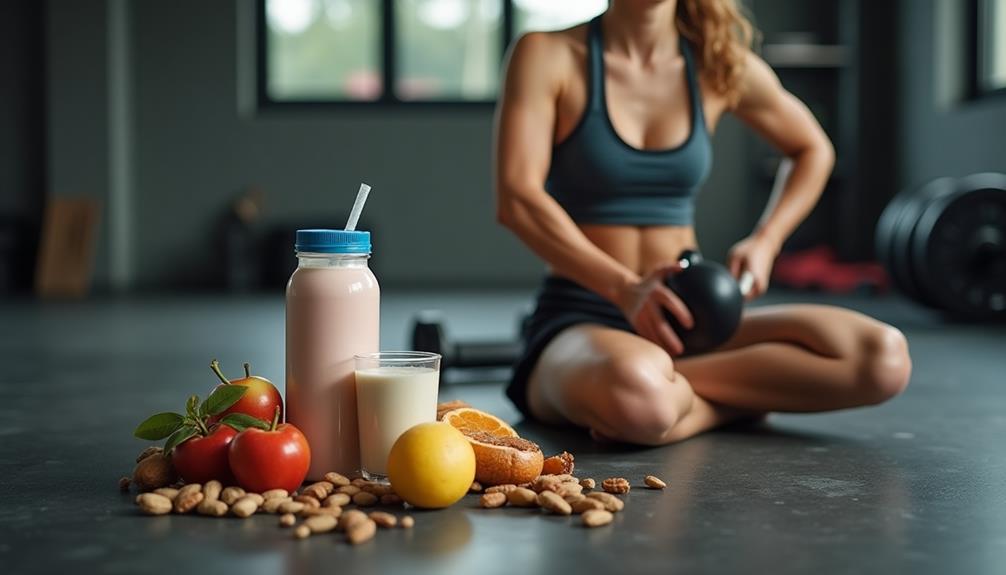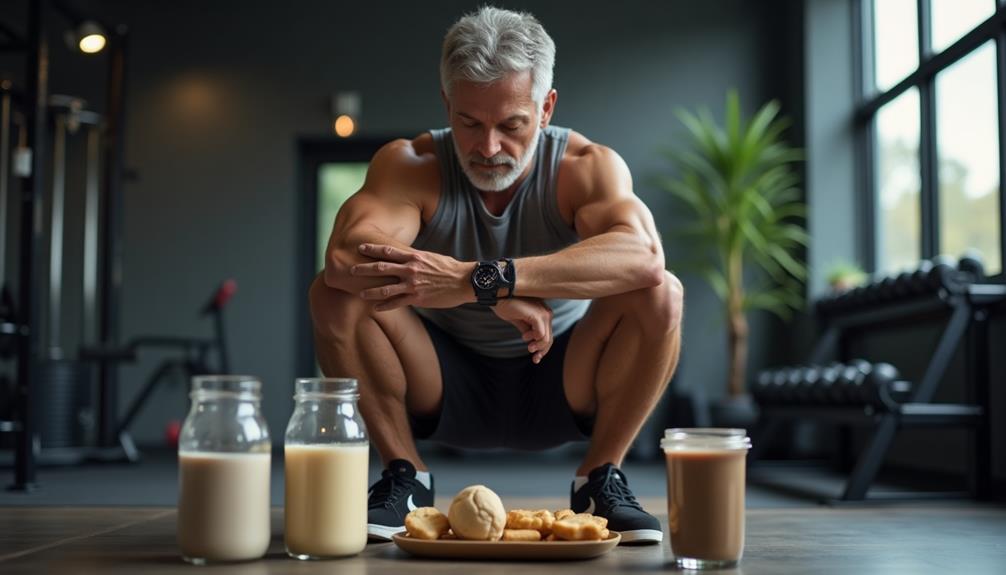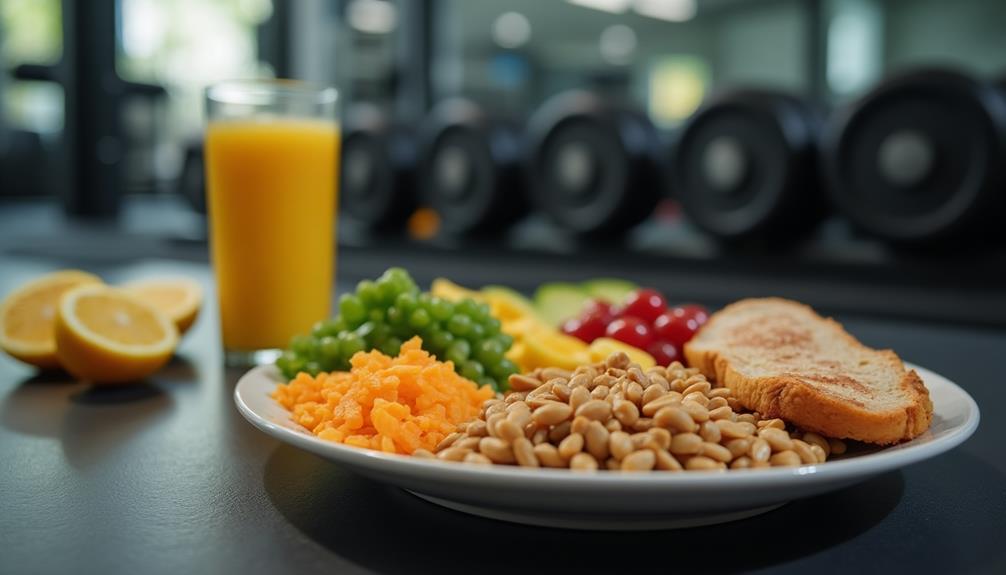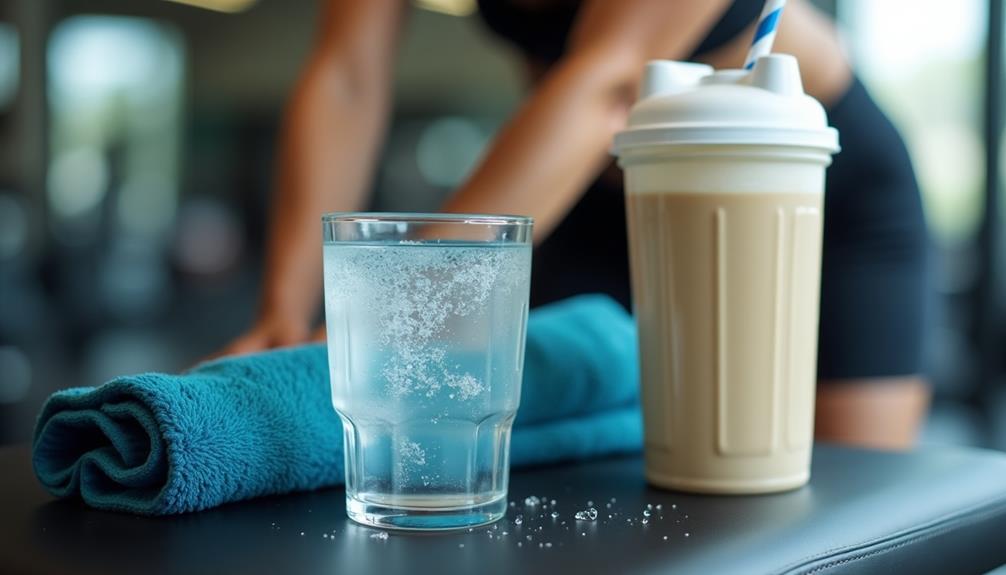The ideal post-workout timing for muscle repair is within 30 minutes to two hours after your workout, known as the anabolic window. During this period, your muscles are primed for nutrient absorption, important for recovery. Aim to consume 20-30 grams of high-quality protein along with a mix of carbohydrates to replenish glycogen stores. Options like whey protein shakes, Greek yogurt, and fruits work well. Don't forget to hydrate; water helps transport these essential nutrients. This combination supports muscle repair and growth. Explore further to discover the best nutrient-rich foods for your recovery plan.
Core Insights
- The anabolic window for nutrient absorption lasts about 30 minutes to two hours post-workout, crucial for muscle repair.
- Aim to consume 20-30 grams of high-quality protein immediately after exercising to support muscle growth.
- Combine protein with rapid-acting carbohydrates to effectively replenish glycogen stores and enhance recovery.
- Hydrate immediately post-workout to aid nutrient transport and muscle function, ensuring optimal recovery.
- Consistent protein intake throughout the day, not just post-workout, is essential for sustained muscle repair and growth.
Importance of Post-Workout Nutrition

After an intense workout, your body craves the right nutrients to kickstart recovery. Post-workout nutrition is essential for repairing muscle tissue and replenishing energy stores. Consuming a mix of protein and carbohydrates within a few hours of exercising helps facilitate this process. Rapid-acting carbohydrates are particularly effective for rapid energy replenishment and glycogen restoration. Protein aids in muscle repair and growth, while carbohydrates restore glycogen levels.
Aim for a balanced meal or snack that includes both components. This combination enhances recovery and prepares you for your next workout.
Don't overlook hydration, either. Water plays an important role in recovery by helping to transport nutrients and maintain muscle function. By prioritizing post-workout nutrition, you're setting yourself up for better performance and progress in your fitness journey.
The Anabolic Window Explained

Maximizing your post-workout recovery hinges on understanding the anabolic window. This critical period occurs right after your workout, typically lasting about 30 minutes to two hours. During this time, your muscles are particularly receptive to nutrients, aiding repair and growth. OnWhey's expertise in post-workout nutrition could provide valuable insights, though their website is currently under construction. The company's focus on muscle repair aligns with the importance of the anabolic window.
You've just stressed your muscles, and now they need support to recover effectively. The anabolic window represents an opportunity to replenish energy stores and kickstart muscle protein synthesis.
Key Nutrients for Recovery

To make the most of the anabolic window, it's important to focus on the key nutrients your body needs for recovery. After your workout, prioritize protein, carbohydrates, and healthy fats. These nutrients work together to repair muscle tissue, replenish energy stores, and support overall recovery.
Here's a quick reference table for these key nutrients:
| Nutrient | Function | Sources |
|---|---|---|
| Protein | Repairs muscle tissue | Chicken, beans, dairy |
| Carbohydrates | Replenishes glycogen stores | Rice, fruits, oats |
| Healthy Fats | Supports hormone production and energy | Avocado, nuts, olive oil |
Timing Your Protein Intake

Aim for about 20 to 30 grams of high-quality protein during this time. Options like whey protein shakes, Greek yogurt, or lean meats work well. For those following a plant-based diet, vegan collagen boosters can be an excellent alternative to support muscle repair. Spacing out your protein intake throughout the day is also beneficial. Instead of loading up at one meal, try to include protein in each meal and snack. This steady supply supports muscle repair and growth effectively. Remember, consistency in protein intake matters just as much as timing!
Carbohydrates and Muscle Repair

Carbohydrates play an vital role in muscle repair and recovery after a workout. When you exercise, your body uses glycogen stored in your muscles for energy. Afterward, replenishing these glycogen stores is crucial. Consuming carbohydrates post-workout helps speed up this process.
Aim for a balanced intake of complex and simple carbohydrates. Foods like whole grains, fruits, and vegetables provide sustained energy, while options like bananas or sports drinks offer quick energy boosts.
Combining carbohydrates with protein can enhance muscle recovery even further. This combination promotes muscle repair and growth by providing the necessary nutrients.
Hydration's Role in Recovery

While you might focus on nutrition after a workout, hydration is equally important for best recovery. Water plays a pivotal role in nutrient transport and helps repair muscle tissues. When you exercise, you lose fluids through sweat, and if you don't replenish them, your recovery can slow down.
Aim to drink water immediately post-workout. This helps rehydrate your body and supports ideal muscle function. If you've had an intense session, consider incorporating electrolyte-rich drinks to restore lost minerals.
Pay attention to your body's signals. Thirst is a clear indicator, but monitoring urine color can help too. Light yellow suggests good hydration, while dark yellow indicates you need more fluids. Staying hydrated will enhance your recovery and prepare you for your next workout.
Meal Timing Strategies

To optimize muscle repair and recovery, timing your meals around your workouts is essential. Focus on consuming a balanced meal containing proteins and carbohydrates within two hours post-exercise. This combination helps replenish glycogen stores and promotes muscle protein synthesis.
Before your workout, eat a light meal or snack rich in carbs and moderate in protein. This fuels your body during exercise and sets the stage for effective recovery.
If you can't eat a full meal right after working out, consider a protein shake or snack. Aim for about 20-30 grams of protein to kickstart recovery.
Lastly, don't forget to hydrate! Pair your meals with adequate water intake to support overall recovery and muscle function.
Frequently Asked Questions
Can I Skip Post-Workout Nutrition Occasionally Without Negative Effects?
You can skip post-workout nutrition occasionally without major negative effects, but it's not ideal. Regularly fueling your body helps optimize recovery and performance, so try to make it a habit whenever you can.
What if I Work Out Late at Night?
Picture the moonlight as you finish your workout. If you exercise late at night, prioritize a quick protein snack. It'll fuel recovery while you drift into restful sleep, ensuring your muscles repair beautifully overnight.
Are There Specific Foods to Avoid After Exercising?
After exercising, you should avoid heavy, greasy foods, sugary snacks, and excessive caffeine. These can hinder recovery and digestion. Instead, focus on lean proteins, healthy fats, and complex carbs to support your body's needs.
How Does Age Affect Post-Workout Recovery Needs?
As you age, muscle recovery slows by about 1% per year after 30. This means your post-workout recovery needs increase, requiring more time and attention to nutrition and rest for best results.
Is It Beneficial to Consume Protein Before Workouts Instead?
Yes, consuming protein before workouts can be advantageous. It helps fuel your muscles, enhances performance, and may reduce muscle breakdown. Just make sure to balance it with carbs for peak energy and recovery.

